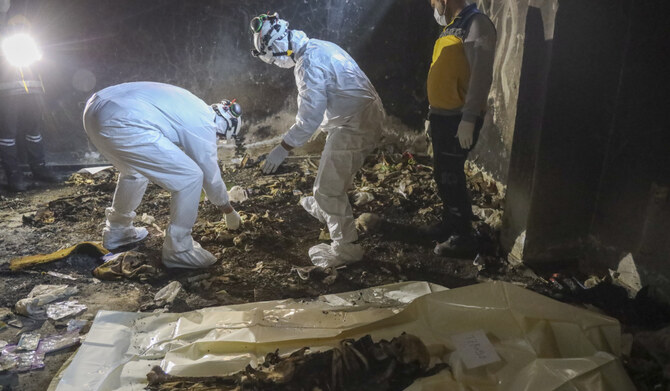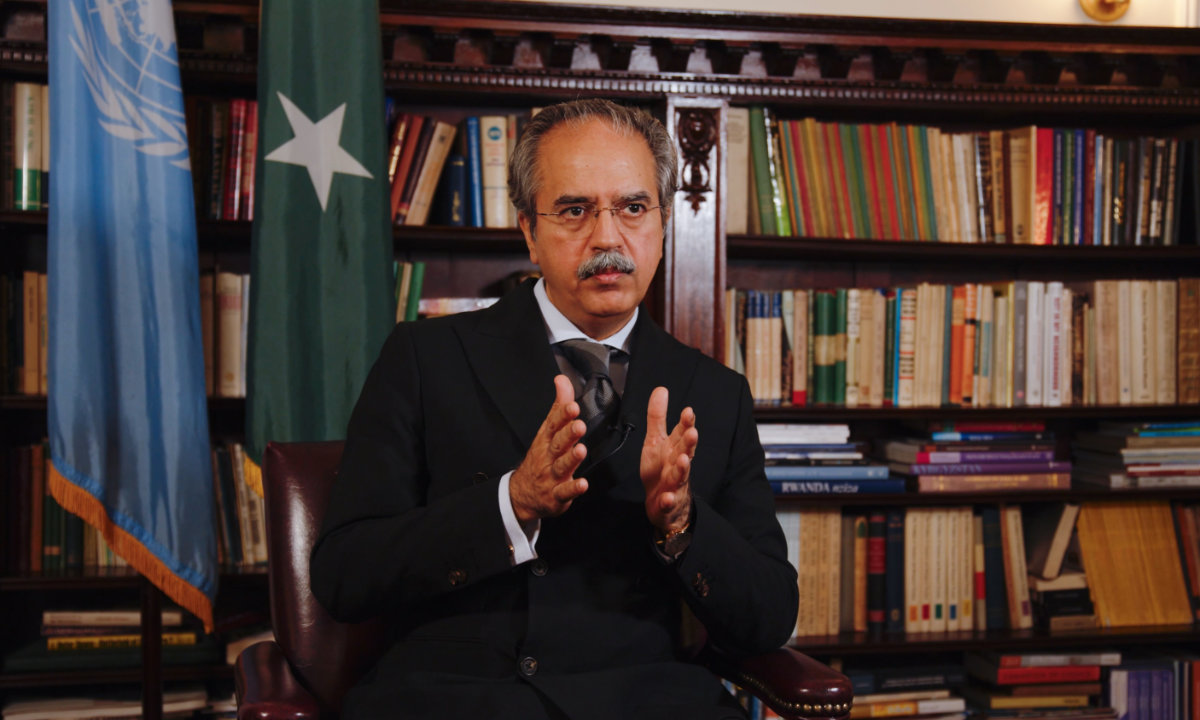DAMASCUS, Syria: The charred remains of at least 26 victims of the Bashar Assad government were located Tuesday by Syrian civil defense workers in two separate basements in rural Damascus.
The discovery adds to the growing tally of mass graves unearthed since the fall of the Assad government in December. The remains, which are believed to include men, women and children, showed evidence of gunshot wounds and burning.
Members of Syria’s White Helmets, a volunteer civil defense group, exhumed the fragmented, weathered skeletal remains from the basement of two properties in the town of Sbeneh, southwest of the capital. Wearing hazmat suits, they carefully logged and coded each set of remains before placing them into body bags, which were then loaded onto trucks for transport.
Since Nov. 28, the White Helmets have uncovered “more than 780 bodies, most of unknown identity,” Abed Al-Rahman Mawwas, a member of the rescue service, told The Associated Press. He said many were found in shallow graves uncovered by locals or dug up by animals. The bodies are transferred to forensics doctors to determine their identities, time of death and cause of death, as well as to match them with possible family members.
“Of course, this takes years of work,” he said.
Mohammad Al-Herafe, a resident of one of the buildings where remains were uncovered, said the stench of decomposing bodies was overwhelming when his family returned to Sbeneh in 2016 after fleeing because of fighting in the area during the country’s uprising-turned-civil war that began in 2011.
He said they found the bodies in the basement but chose not to report it out of fear of government reprisals. “We could not tell the regime about it because we know that the regime did this.”
The Assad government, which ruled Syria for over two decades, employed airstrikes on civilian areas, torture, executions and mass imprisonment, to maintain control over Syria and suppress opposition groups during the country’s 13-year civil war.
Ammar Al-Salmo, another Civil Defense member dispatched to the second basement site, said further investigation is needed to identify the victims.
“We need testimonies from residents and others who might know who stayed behind when the fighting intensified in 2013,” he told the AP.
Mohammad Shebat, who lived in the second building where bodies were found, said he left the neighborhood in 2012 and returned in 2020 when he and his neighbors discovered the bodies and demanded their removal. But no one cooperated, he said.
Shebat believes the victims were civilians who fled the nearby Al-Assali neighborhood when the fighting escalated and the Assad government imposed a siege in 2013. He said forces of the former government used to “trap people in basements, burn them with tires and leave their bodies.”
“There are several basements like this, full of skeletons,” he said.
In a report released Monday, the United Nations Syria Commission of Inquiry said that mass graves can be used as evidence to uncover the fates of thousands of missing detainees.
The report, spanning 14 years of investigations and drawing on over 2,000 witness testimonies, including more than 550 survivors of torture, detailed how detainees in Syria’s notorious prisons “suffering from torture injuries, malnutrition, disease and illness, were left to die slowly, in agonizing pain, or were taken away to be executed.”
Assad’s fall on Dec. 8 drove hundreds of families to scour prisons and morgues in desperate search of loved ones. While many were freed after years of imprisonment, thousands remain missing, their fates still unknown.
The UN commission has said that forensic exhumations of mass graves, as well as safeguarding evidence, archives and crime sites, may offer grieving families a chance to learn the truth.
The commission was established in 2011 by the Human Rights Council to investigate Syria’s alleged violations of international human rights law.
The UN report documented brutal methods of torture by the former government, including “severe beatings, electric shocks, burning, pulling out nails, damaging teeth, rape, sexual violence including mutilation, prolonged stress positions, deliberate neglect and denial of medical care, exacerbating wounds and psychological torture.”
“For Syrians who did not find their loved ones among the freed, this evidence, alongside testimonies of freed detainees, may be their best hope to uncover the truth about missing relatives,” said Commissioner Lynn Welchman.































